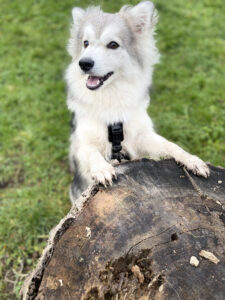SUPAW NANNY Neutering Policy

Deciding when to neuter your male dog can often seem like a bit of a minefield, particularly with strong and differing views floating around the wild west that is the internet. Here at SuPaw Nanny, our summary on the matter is fairly simple- it all depends on the individual dog.
While we do support neutering as standard in general for social dogs (and by that we mean dogs that attend daycare or are just generally around other dogs in a social setting such as a park), we don’t have a blanket policy for dogs to be neutered by a set age, as it just doesn’t make sense. The best time to neuter depends on a whole multitude of things and as such, we will always make recommendations and decisions based only on that individual dog, the behaviour they are demonstrating, and what we think is best for them.
To give a starting point, unless you have a large breed dog, pups will be fine to be neutered from 6-7 months old and this is when many choose to book their dogs in with the vets. We don’t recommend neutering any younger than 6 months.
As the testosterone levels in male dogs starts to rise, we generally start to see a change in behaviour as their true personality gets swamped by hormones. This starts to show itself by dogs humping, guarding, becoming fixated on other dogs, becoming stressed and vocal and ultimately becoming ‘spikey’ and aggressive with other dogs. None of this is suited to a harmonious social environment such as daycare, and importantly- none of this is nice for that dog either.
This change in behaviour almost always happens within daycare first, as this is the place where they are around other dogs that they feel most comfortable and settled. Often we will let owners know and it will come as a surprise because they haven’t seen it themselves in the local park or with their friends dogs etc. This is totally normal, but does sometimes make it difficult to explain to owners that the problem is on the horizon and now is the time to act before it gets worse and spills into those lovely neighbourhood walks.
At SuPaw Nanny, we are determined to provide the safest, friendliest and most sociable environment for all our dogs to be in. As such, we welcome unneutered dogs under the following conditions:
- they are not excessively humping
- they are not displaying dominant behaviour
- they are not causing dominant behaviours from other dogs due to their intact status
- they are not creating an unsafe play environment
- their presence is not reducing the overall peacefulness of the group
All dogs are constantly monitored when they are in daycare, but as male dogs reach 6-7 months of age we keep an extra careful eye on them to watch out for the behaviour listed above. If/ when these do start to show, we’ll let you know through the following stages:
- Stage 1: Their behaviour is naturally starting to shift and we are starting to see infrequent examples of the list above during their time in daycare. Now is the time to start thinking about neutering- if your pup is over 7 months and is not a large breed dog, we would recommend to get them booked in for neutering.
- Stage 2: Their behaviour has progressed and we are now seeing these issues more frequently and it is preventing them from fully enjoying and flourishing in daycare, but is still manageable in the short term. Once a dog reaches this stage, they need to be booked in for neutering as soon as possible to be able to continue coming to SuPaw Nanny.
- Stage 3: The issues we have been seeing are now consistent and their behaviour is now disruptive and poses a risk to other dogs. They are no longer able to safely go into a group daycare environment. They must be booked in for neutering right away or sadly will need to cancel their space with SuPaw Nanny.
Its important to keep in mind that behaviour changes can progress quickly and dogs can go from stage 1 to stage 3 in a very short space of time. Stage 1 is always the most sensible time to take action to make sure that negative hormonal behaviour traits don’t become learned behaviour – something that will cause a bigger and longer term problem for your dog as it is less likely to change even after neutering.
Remember that when speaking to your vet about neutering, its really important to explain to them that they attend a social daycare and that they are displaying these behaviours, and that the advice to neuter is based on this rather than a blanket policy, or one based on age. A good vet should take this into consideration when advising on neutering and should not recommend delaying to a certain arbitrary age if these problems have developed.
If your vet doesn’t fully understand the implications of not neutering on social behaviour (some sadly don’t!), you should feel able to speak to other vets at other practices too.
If you have reservations about neutering your dog, please speak to us about them and we can offer advice and our opinion based on the care we have provided to social dogs over the past 15 years.
Whist the vast majority of owners choose to surgically neuter their dogs, if you want to test the water beforehand to see what effects it has – chemically neutering is a great alternative – we chose this option for our own male Golden Retriever ‘Spud’. This is an implant that lasts either 6 months or a year that provides the same result as surgically neutering your dog, but means that it can be left to expire if it doesn’t have the desired effect on behaviour within daycare and social environments. If you do go for the chemical option, you must make sure that you keep up with this each time they come to expire, or have them fully neutered in place of the implant, for your dog to be able to keep attending SuPaw Nanny daycare.
 With female dogs, the general recommendation from vets is to have your pup spayed after 6 months old, either before they come into season, or after their first season- whichever you personally prefer. Un-spayed female dogs are very welcome in daycare, apart from when they are actually in season. During this time, they need to be kept out of group play to prevent any unwanted pregnancies and also to prevent the boys going wild! If you choose not to spay your female dog, this is absolutely fine- you’ll just need to factor in that they wont be able to attend daycare during each season and these days will need to be cancelled and will be charged. A season will usually last 2-3 weeks from start to finish.
With female dogs, the general recommendation from vets is to have your pup spayed after 6 months old, either before they come into season, or after their first season- whichever you personally prefer. Un-spayed female dogs are very welcome in daycare, apart from when they are actually in season. During this time, they need to be kept out of group play to prevent any unwanted pregnancies and also to prevent the boys going wild! If you choose not to spay your female dog, this is absolutely fine- you’ll just need to factor in that they wont be able to attend daycare during each season and these days will need to be cancelled and will be charged. A season will usually last 2-3 weeks from start to finish.
Appreciate this is fairly long winded, but with it being such a controversial topic we always feel it’s best to be completely transparent about our approach! We hope this helps!
Regards,
SuPaw Nanny


It’s difficult to find experienced
people for this subject, however, you seem like you know what you’re talking about!
Thanks